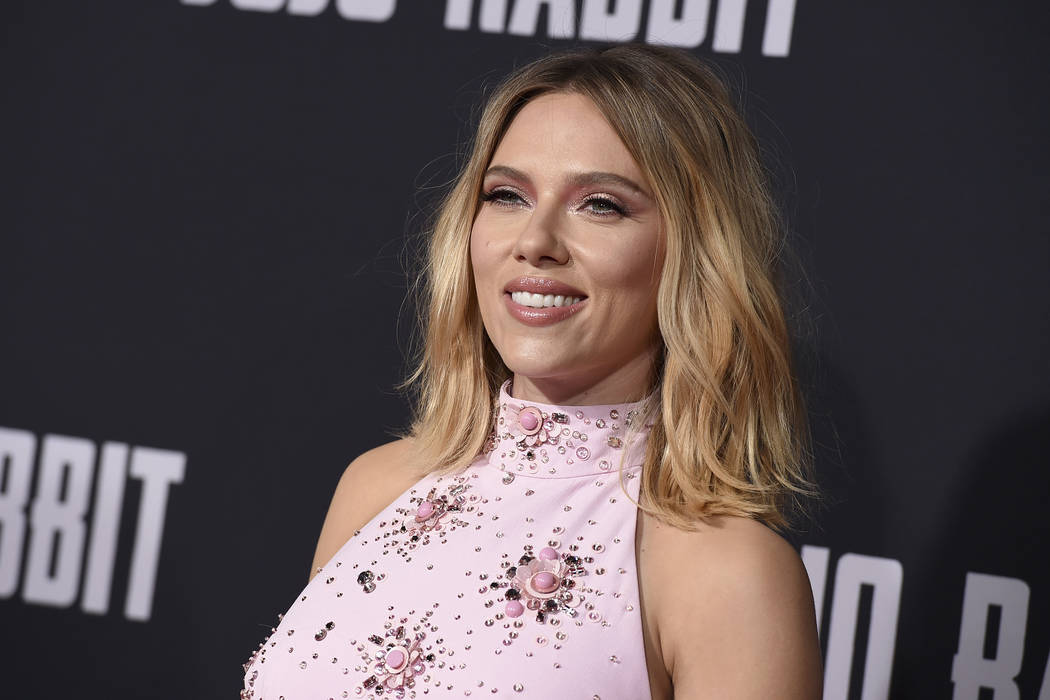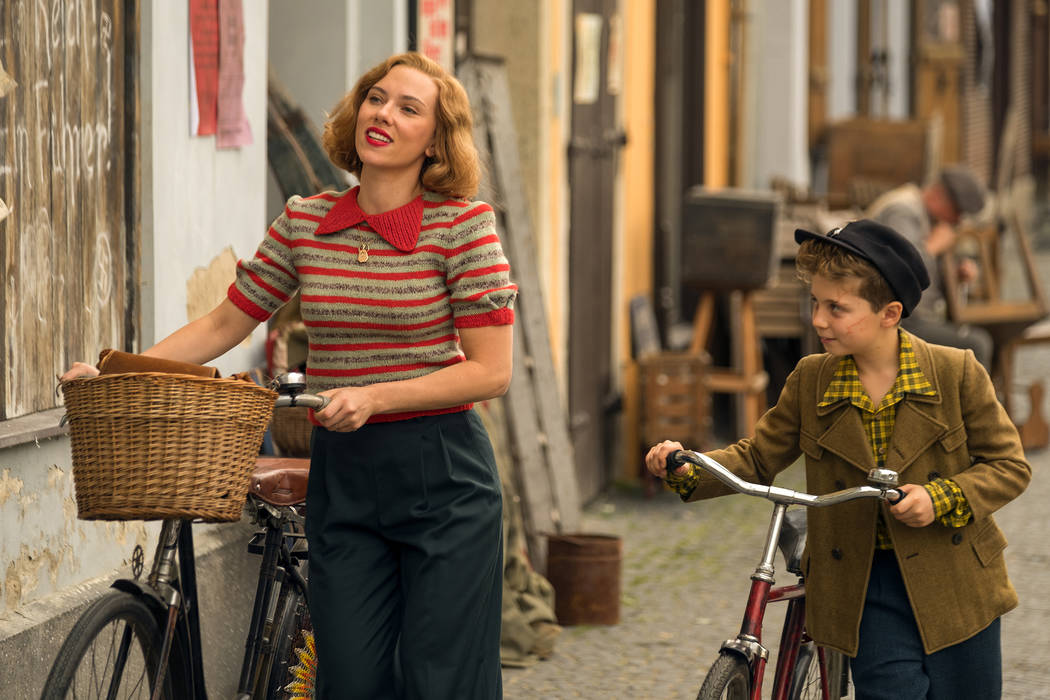Scarlett Johansson talks motherhood, powerful roles
She saved half of humanity from Thanos at the end of “Avengers: Endgame.” Turns out that was easy stuff compared to facing a room full of 5-year-olds. “I prefer that the kids in my daughter’s school just think of me as Rose’s mom and not Black Widow,” said Scarlett Johansson, who might just be the best show-and-tell presentation ever.
What happened when the movie star hit the classroom? “Kindergarten is very equalizing. It doesn’t matter if I’m in the biggest movie of the year,” she said of “Avengers: Endgame.” “Little kids in my daughter’s class pointed at me and whispered, ‘Yeah, that’s the mom who always sends the good chips.’ ”
When she’s not packing lunches, the 34-year-old native New Yorker, engaged to “Saturday Night Live’s” Colin Jost, can be found on movie sets. She stars in the new film “Jojo Rabbit.” Directed by Taika Waititi, it’s the story of a young boy in Hitler’s Germany who finds out that his mother, Rosie (Johansson), is hiding a Jewish girl in their attic at the end of World War II.
In “Marriage Story,” Noah Baumbach’s drama debuting on Netflix on Dec. 6, she plays actress Nicole, half of a married duo with stage director Charlie (Adam Driver). As their marriage falls apart, they contemplate the good times and bad as they plan a bicoastal split.
Review-Journal: What is your idea of a great Sunday?
Scarlett Johansson: Really, my favorite thing to do on a Sunday is go to a new movie with my daughter Rose (who is 5) and sit there eating crispy chicken fingers. That’s the best!
Tell us about “Jojo Rabbit,” which is billed as an anti-hate satire.
A couple of people told me about this script for “Jojo Rabbit” by writer-director Taika Waititi and eventually I said, “I gotta read this thing.” The script itself was such a perfect gem. It was so well-written and I’ve read enough scripts in my lifetime to really know how rare it is when something feels so special, childlike and whimsical. At the same time, it felt so poignant, sad, brutal and dynamic. I knew immediately that I wanted to do it.
The movie is told from the point of view of your character’s 10-year-old son (Roman Griffin Davis), who is processing life in Nazi Germany. He conjures up Hitler.
Taika allows this child to be an innocent kid in the middle of this nightmare. Nothing can make sense to this child anymore during the war, so he has to protect himself by creating this imaginary world where Hitler comes to his house and talks to him. It was such a special and unique way to tell a story.
What was it like to have Waititi call the shots while he was dressed as Hitler?
When I first saw him on the set in Prague, Taika was in regular clothing, but he warned me that he would look really scary as Hitler. I’ve seen a lot of people in weird costumes over the years. But the Hitler costume and makeup was so terrifying. It was very jarring at first, but we got there.
“Marriage Story” from director Noah Baumbach is a coming-of-age-story about a wife/mother who needs to take charge of her own life, which means ending her marriage.
It struck such a chord in me when I read the script, and now I cry each time I see the movie. It’s about being human and flawed, but the script didn’t judge how these people are. It just showed them with all of their sides. … And yes, it is a coming-of-age story. Nicole realizes that she has been living her husband’s dream, which just doesn’t feel right anymore. In a way, she’s a woman having a coming of age in her 30s. I guess that’s what we all do throughout life. We have these coming-of-age moments at various ages because life is always changing.
What would an Oscar nomination mean to you for either of these films?
I’ve never had that experience. I could only imagine it would be very touching. The Academy is full of people I admire so much. It would be an amazing feeling to know that your industry is recognizing you.
You’re filming a “Black Widow” movie, set for 2020, where you will resume your roles as Natasha Romanoff/Black Widow in a story set between the films “Captain America: Civil War” (2016) and “Avengers: Infinity War” (2018). We’re open to any plot secrets.
(Laughs.) I need this film to be able to process Natasha’s death because there is a lot to unpack for her. She’s a very complex woman who has a lot of shame, which is why the movie is partly about forgiveness. She was given a lot of responsibility for things without being given a choice. I need to be able to process those things in order to let the character go.
When did you know that Black Widow was going to die?
Before we started “Infinity War.” One day, I was at home and got a call from Kevin Feige (president of Marvel Studios). It was normal to get a call from him because we were waiting for a new script. I thought, “Oh, this is about that script.” Then he told me the real reason behind the call, which was I was going to die in the last movie.
Were you shocked?
I was sad, but I was able to understand why it had to happen. It made sense to me when I stood opposite Jeremy Renner and Black Widow offered up her life. She chose to save a friend’s life — a friend she loved. And she chose to save half of humanity. It came from a very pure place.
Forever, you will be a strong role model to women and girls through your Black Widow character.
I love that part of it. In the Marvel films, these characters are flawed, reluctant heroes. But, we see them choose to act from their hearts. They do what feels right to them. That’s a powerful message to teach young girls. Trust yourself and your intuition. So many fans have said, “I’m so deeply thankful that these heroes exist and I can live through them.” That means everything to me.


















